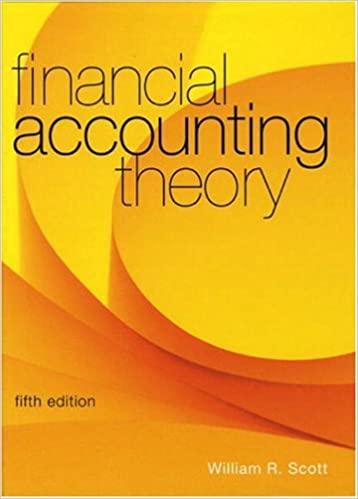A serious problem with fair-valuing complex financial instruments was revealed by the August 2007 meltdown of markets
Question:
A serious problem with fair-valuing complex financial instruments was revealed by the August 2007 meltdown of markets for collateralized debt obligations (CDO) and other asset-backed securities.
The meltdown arose in the U.S. mortgage market. Many mortgage loans had been made to poor credit risks who, the market feared, would be unable to meet increased variable-rate mortgage payments due to rising interest rates or expiration of low introductory rates.
Many of these mortgages had been repackaged by the original lenders into CDOs, that is, tranches of similar credit risk, and resold to other financial institutions. A claimed advantage of these tranches was that a CDO's mortgage default risk (i.e., credit risk) was dispersed across many different mortgages, and that it was unlikely that all, or even a few, of these homeowners would default. Furthermore, credit risk was often further dispersed by means of credit default swaps (CDS). These are financial instruments whereby, for a fee, the CDO investor would be reimbursed by the CDS issuer for all or part of any credit losses sustained. In effect, CDSs bootstrapped the quality of CDOs backed by poor-credit risk mortgages. Many of these CDOs were purchased by hedge funds and mutual funds, including funds in Europe and elsewhere.
Other major CDO purchasers included “conduits.” These are financial institutions that financed their CDO purchases by issuing asset-backed commercial paper (ABCP), which is short-term commercial paper secured by CDOs. ABCP was very popular as a vehicle whereby firms could safely invest excess cash temporarily. Other major ABCP purchasers included money-market mutual funds. While the interest rate paid by ABCP was low, it was higher than that of, for example, government treasury bills, another common short term investment. The perception of ABCP safety was further enhanced because they generally received top ratings from credit-rating agencies. Conduits earned their profits from the spread between the interest earned on their CDOs and the lower interest they paid on their ABCP.
As evidence (e.g., increasing default rates) that the U.S. mortgage market was in trouble grew in the months leading up to August 2007, concerns about the security of CDOs also grew. Matters came to a head when two hedge funds operated by Bear Stearns Co. in New York declared bankruptcy because of CDO losses. Shortly afterwards, on August 9, BNP Paribas, France’s biggest bank, halted redemptions of three of its mutual funds because it was unable to determine the fair value of the CDOs they contained. Several German funds followed suit.
While CDOs and CDSs were effective in dispersing risk, models used to establish their fair value had not anticipated the effects of lack of transparency concerning the quality of the mortgages underlying them. Once concern about mortgage defaults appeared, investors lost confidence in all CDOs, leading to a herd effect whereby no one was willing to hold them. Thus, the market collapsed. Instead of eliminating risk, it seems that CDOs and CDSs had merely transferred it from credit risk to liquidity risk.
Since ABCP was secured by CDOs, concerns about the security of ABCP also grew.
Eventually no one would buy ABCP either. As a result, conduits were unable to redeem maturing ABCP from the proceeds of new ABCP issues, which spread the liquidity crisis to the short-term credit market. Since the CDOs securing the ABCP were virtually unsaleable, many firms and funds had to sell other assets to obtain needed cash, putting downward pressure on stock markets. e Central banks responded to these events by lowering interest rates and making it easier for banks and others to borrow funds. However, it quickly became apparent that the world financial system suffered from serious structural problems that would take some time to fully understand and fix.
Required
a. Why was BNP Paribas unable to determine the fair value of its CDOs?
b. Why did CDS not prevent the collapse of public confidence in CDOs and ABCP?
Step by Step Answer:






